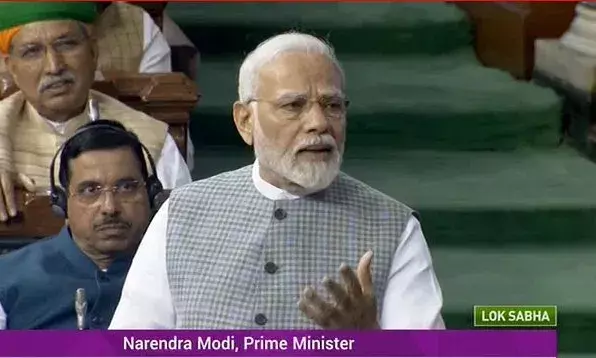Modi Kicks Off 2024 Campaign with Congress as Target, Promises 370 Seats for BJP
Prime Minister Narendra Modi's address during the budget session of Parliament has ignited the political landscape, marking the potential start of the Bharatiya Janata Party's (BJP) campaign for the upcoming general elections.;

Prime Minister Narendra Modi’s address during the budget session of Parliament has reverberated across the political landscape, signaling the beginning of the Bharatiya Janata Party’s (BJP) electoral campaign for the upcoming general elections. In a speech brimming with confidence and conviction, Modi not only highlighted his government’s achievements but also set the stage for a spirited electoral battle ahead.
Central to Modi’s address was his projection of optimism and assurance regarding the BJP’s prospects in the forthcoming polls. With characteristic confidence, he forecasted a resounding victory for the BJP, boldly predicting a tally of 370 seats in the next Lok Sabha. This ambitious proclamation serves as a rallying cry for the BJP cadre, instilling a sense of purpose and determination as they gear up for the electoral contest.
However, beyond the rhetoric of electoral triumph, Modi’s speech was marked by a deliberate focus on the Congress party. Rather than engaging with the broader spectrum of opposition parties or discussing national issues, Modi directed his attention squarely towards his primary political adversary. By invoking familiar tropes such as Nehru, Indira Gandhi, dynasty, and Rahul Gandhi, Modi sought to underscore the ideological differences between the BJP and the Congress, framing the electoral contest as a battle of contrasting visions for India’s future.
At the heart of Modi’s narrative was the accusation of “cancel culture” leveled against the Congress party. In Modi’s view, the Congress’s persistent criticism and attempts to discredit his government’s achievements amounted to a concerted effort to undermine India’s progress under his leadership. By framing the discourse in this manner, Modi sought to position the BJP as the sole custodian of India’s development and portray the Congress as obstructionist forces clinging to outdated ideologies.
This emphasis on the Congress reflects the BJP’s overarching electoral strategy, which seeks to capitalize on the perceived weaknesses and vulnerabilities of its principal opponent. By portraying the Congress as an impediment to India’s growth and positioning himself as the harbinger of change and progress, Modi aims to galvanize support for the BJP and mobilize voters across the country.
Moreover, Modi’s speech serves to energize the BJP cadre and rally them around a common enemy, thereby fostering a sense of unity and purpose within the party ranks. By framing the electoral contest as a battle between the BJP’s vision of a resurgent India and the Congress’s alleged regressive agenda, Modi aims to mobilize grassroots support and consolidate the party’s electoral base.
However, while Modi’s focus on the Congress may resonate with the BJP’s core supporters, it remains to be seen how effectively this narrative will resonate with the broader electorate. As India grapples with pressing challenges ranging from economic slowdowns to social unrest, voters may prioritize issues of governance and delivery over partisan rhetoric and political skirmishes.
Furthermore, the BJP’s electoral prospects are likely to be influenced by a myriad of factors, including regional dynamics, coalition politics, and voter sentiment on the ground. While Modi’s popularity remains a significant asset for the BJP, the party cannot afford to be complacent in the face of a resurgent opposition and shifting electoral landscapes.
Prime Minister Narendra Modi’s speech in the budget session of Parliament serves as a strategic blueprint for the BJP’s electoral campaign in the upcoming general elections. By focusing his attention on the Congress and framing the electoral contest as a battle between progress and regress, Modi seeks to galvanize support for the BJP and consolidate its position as the dominant political force in India. However, the ultimate verdict lies with the voters, who will determine the outcome of the elections based on their assessment of governance, performance, and leadership. As the nation embarks on this journey towards the ballot box, one thing remains certain: the stage is set for a fiercely contested electoral battle that will shape India’s political landscape for years to come.

